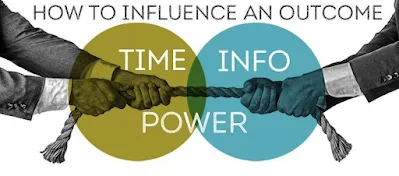Power ( Part 8 ) - The Power of the Knowledge of "Needs"
Good Day Readers, Today we will be discussing "The Power of the Knowledge of 'Needs'".
In all negotiations, there are 2 things being bargained for:
- The Specific Issues and Demands, Which are stated Openly.
- The Real Needs of the other side, which are rarely verbalized.
Let me Illustrate this distinction by returning to the Sears Refrigerator Analogy. Let's Assume you walk into the Large Appliances Department and say to a salesman, "Look ... If you sell me this $489.50 Model for $450, I'll pay you in cash right now!"
Will this approach work with Sears? No. The Proportion fails to meet that organization's true needs. Why? As you know, Sears may not really be a retail establishment. It merely fronts as one. Actually, Sears is a financial institution that may prefer that you change your purchase. Why? So it can get a hefty 18% Interest on Money still to be paid on your revolving charge account.
Will this money-on-the-barrelhead approach work elsewhere? Yes; depending on where you try it. If you make the same offer to a neighborhood hardware store that is experiencing a cash-flow problem, the Proprietor will probably knock you over in his haste to accept. You see, he'll be able to wheel and deal with the cash.
Moreover, who can say whether he'll actually declare it on his Income-Tax Return?
Everyone's needs are different. Sears doesn't need your cash; a small Proprietor often does. If you can establish a reasonable guess about what someone's needs are, you can predict, with remarkable certainty, what will happen in any interaction.
Never forget that behind every apparently ruthless or uncaring organization or institution, there are ordinary people desperately striving to meet their unique needs.
To successfully interact with any individual in any setup, all you have to do is determine his/her needs, then fulfill them. So when someone says to you in negotiation, "This is my rock-bottom figure!" ( Ever Notice how they all use that geological semanticism?), is that their real rock-bottom or their really real rock bottom?
Essentially what people say they want ( their demands) may not be what will actually satisfy their needs. For example, let's say I intend to buy a new car. I have a particular model and a particular dealership in mind. My approach is 2 pronged:
- I gather so much specific data as I can about the car itself. this isn't hard to come by. I check the Blue Rock and Consumer Reports. I talk to recent buyers of the Model. I question service station mechanics who've worked on it. I jot down notes on Performance, Costs, and Potential Service Problems.
- Next, I find out as much as possible about the dealership. This information isn't hard to come by either if I ask the right people- those who've dealt with the dealer- the right questions. I pinpoint his reputation. I learn the current status of his business, the extent of the inventory he must finance, his itemized costs, and how his salespeople are compensated. I check with other competing dealerships to determine their pricing.
Then, with respect to the dealer himself, I acquaint myself with his likes, dislikes, prejudices, and value systems. I find out if he's the type who makes quick decisions or deliberate decisions. I discover whether he likes to take risks or whether he's an advocate of the one-in-the-hand-is-worth-two-in-the-bush outlook.
If this sounds unrealistic for you to tackle, keep in mind that you are about to invest thousands of dollars in a car that at best you hope will give you reasonably good service for some years.
As I said before, if the deal is worth your time and money, it's worth preparing yourself to make it a good deal.
When face to face with the dealer, or one of his key salesman, I probe, Observe, Ask questions, and Listen more than I talk. This gives me valuable Information that enables me to best structure the negotiation.
I then adapt my purchasing style to satisfy the real needs of the seller. His real needs may be to bargain, to haggle like a rug merchant in an oriental bazaar. He may get a kick out of bargaining, out of matching wits.
I adroitly play the game because I, too, like to negotiate over big-ticket items. I most assuredly won't meet the seller's Price Demands, but I'll meet his real, nonverbalized needs.
The Transaction will be concluded to the satisfaction of all concerned.
So, This Power of knowledge is also essential in Negotiation.
Next we will Discuss About:


Post a Comment